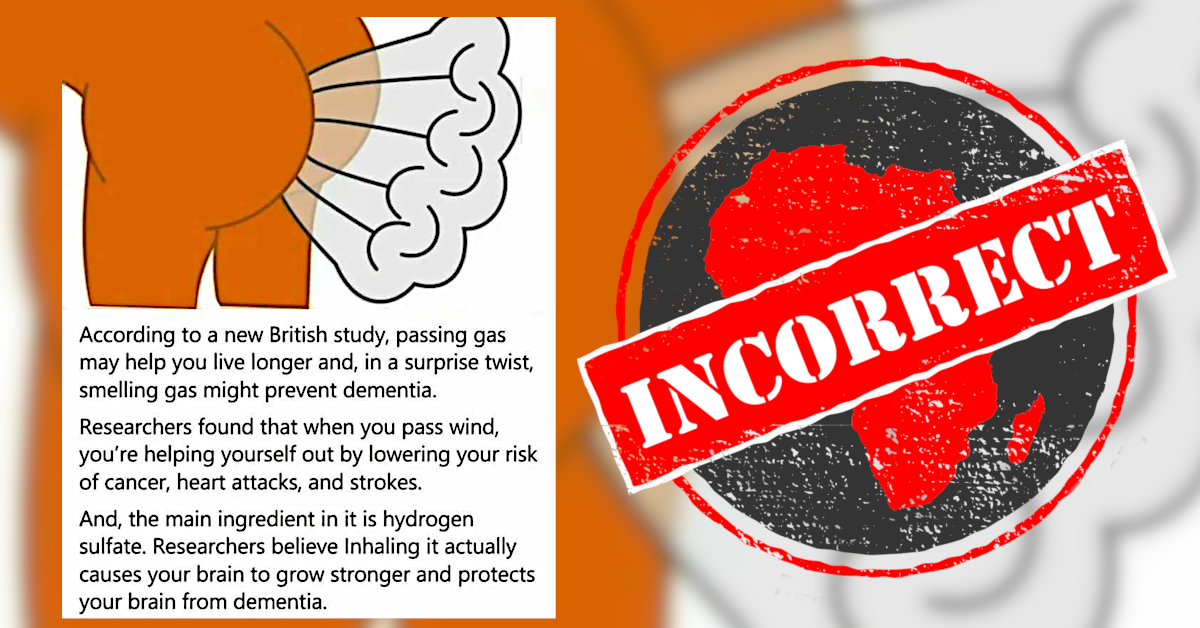Farting can lengthen your life and protect your brain, claims a meme circulating on Facebook in Nigeria since May 2016.
“According to a new British study, passing gas may help you live longer and, in a surprise twist, smelling gas might prevent dementia,” it reads beneath a cartoon of farting buttocks.
“Researchers found that when you pass wind, you are helping yourself out by lowering your risk of cancer, heart attacks and strokes.”
It says farts contain “hydrogen sulfate”, which makes the brain “stronger” and so prevents dementia.

The meme’s claims can be traced to a 2014 University of Exeter press release titled Rotten egg gas holds key to healthcare therapies. It discusses the “health benefits” of “hydrogen sulfide”.
“It may smell of flatulence and have a reputation for being highly toxic, but when used in the right tiny dosage, hydrogen sulfide is now being found to offer potential health benefits in a range of issues, from diabetes to stroke, heart attacks and dementia,” the statement reads.
It says the university is developing a new compound, AP39, with the potential to treat diabetes, stroke, heart attacks and dementia.
But the compound was being developed from rotten egg gas – not human farts, as claimed in the meme.
The press release and its related scientific studies do not make any mention of flatulence as a health benefit.
The release does say the new AP39 compound smells like farts. But this doesn’t mean farts have the same chemical composition as AP39.
The hydrogen sulphide given off by rotten eggs is not the same as the gas produced by human flatulence.
Scientific studies published on the use of the AP39 compound do not mention any health benefits of making or smelling farts.
When news of the compound made the rounds in 2014, the research was still in its early stages and had not been trialled on humans. – Lloyd Hazvineyi
“According to a new British study, passing gas may help you live longer and, in a surprise twist, smelling gas might prevent dementia,” it reads beneath a cartoon of farting buttocks.
“Researchers found that when you pass wind, you are helping yourself out by lowering your risk of cancer, heart attacks and strokes.”
It says farts contain “hydrogen sulfate”, which makes the brain “stronger” and so prevents dementia.

No truth to claims
The meme’s claims can be traced to a 2014 University of Exeter press release titled Rotten egg gas holds key to healthcare therapies. It discusses the “health benefits” of “hydrogen sulfide”.
“It may smell of flatulence and have a reputation for being highly toxic, but when used in the right tiny dosage, hydrogen sulfide is now being found to offer potential health benefits in a range of issues, from diabetes to stroke, heart attacks and dementia,” the statement reads.
It says the university is developing a new compound, AP39, with the potential to treat diabetes, stroke, heart attacks and dementia.
But the compound was being developed from rotten egg gas – not human farts, as claimed in the meme.
No mention of benefits of flatulence
The press release and its related scientific studies do not make any mention of flatulence as a health benefit.
The release does say the new AP39 compound smells like farts. But this doesn’t mean farts have the same chemical composition as AP39.
The hydrogen sulphide given off by rotten eggs is not the same as the gas produced by human flatulence.
Scientific research does not support claim
Scientific studies published on the use of the AP39 compound do not mention any health benefits of making or smelling farts.
When news of the compound made the rounds in 2014, the research was still in its early stages and had not been trialled on humans. – Lloyd Hazvineyi
Republish our content for free
For publishers: what to do if your post is rated false
A fact-checker has rated your Facebook or Instagram post as “false”, “altered”, “partly false” or “missing context”. This could have serious consequences. What do you do?
Click on our guide for the steps you should follow.
Publishers guideAfrica Check teams up with Facebook
Africa Check is a partner in Meta's third-party fact-checking programme to help stop the spread of false information on social media.
The content we rate as “false” will be downgraded on Facebook and Instagram. This means fewer people will see it.
You can also help identify false information on Facebook. This guide explains how.


Add new comment